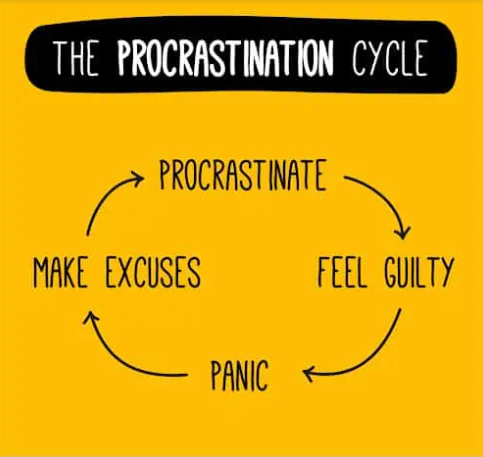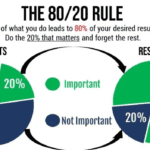How to Stop Procrastinating and Get More Done
We’ve all been there—staring at a long to-do list but choosing to scroll through social media, binge-watch a show, or convince ourselves that we’ll “start later.” Procrastination is a common struggle, but the good news is that it’s a habit that can be broken.
If you find yourself constantly putting off tasks and feeling frustrated by your lack of productivity, this post is for you. We’ll explore why procrastination happens and, more importantly, how to overcome it with practical, science-backed strategies.
Why Do We Procrastinate?
Procrastination isn’t just about being lazy—it’s a psychological response to discomfort. Our brains prioritize short-term pleasure over long-term rewards, leading us to avoid tasks that feel overwhelming, boring, or difficult.
Common Reasons We Procrastinate:
🔹 Fear of failure – Worrying that we won’t do well, so we avoid starting.
🔹 Perfectionism – Waiting for the “perfect” moment or ideal conditions.
🔹 Lack of motivation – The task doesn’t feel urgent or exciting.
🔹 Overwhelm – The task seems too big, so we freeze instead of acting.
🔹 Instant gratification – Choosing short-term pleasures (social media, TV) over long-term benefits.
The key to overcoming procrastination is to shift how we approach tasks—making them easier to start and rewarding to complete.
How to Stop Procrastinating: 10 Practical Strategies
1. Break Tasks Into Smaller Steps
A big project can feel overwhelming, leading to avoidance. Breaking it into smaller, manageable tasks makes it less intimidating.
🔹 Try This: Instead of writing “Complete project,” break it into:
✔ Research topic
✔ Write an outline
✔ Draft the introduction
✔ Edit the final version
Completing small steps builds momentum and makes the task feel achievable.
2. Use the 2-Minute Rule
If something takes less than two minutes, do it immediately. This prevents small tasks from piling up and creating stress.
For bigger tasks, commit to just two minutes of work—once you start, you’ll often keep going.
🔹 Example: Instead of saying, I need to clean my entire house, say, I’ll clean for two minutes.
3. Set Clear, Specific Goals
Vague goals lead to procrastination. Clear, actionable goals create focus and direction.
🔹 Instead of: “I’ll work on my business.”
🔹 Try: “I’ll spend 30 minutes researching marketing strategies today.”
4. Use the Pomodoro Technique
The Pomodoro Technique boosts focus and prevents burnout:
✅ Work for 25 minutes (set a timer).
✅ Take a 5-minute break.
✅ Repeat 4 times, then take a longer 15-30 minute break.
Short, timed work sessions make tasks feel more manageable and prevent distractions.
5. Eliminate Distractions
We often procrastinate because distractions are too tempting. Create an environment that helps you focus.
🔹 Try This:
- Put your phone on Do Not Disturb mode.
- Use website blockers like Cold Turkey or Freedom to prevent social media distractions.
- Work in a clutter-free, quiet space.
6. Set Deadlines (Even If There’s No Real One)
Deadlines create urgency and force action. If a task doesn’t have one, create your own.
🔹 Example: If you want to write a book but have no set deadline, challenge yourself: I’ll write 1,000 words by Friday.
Public accountability helps—tell a friend or post about your deadline for extra motivation.
7. Reward Yourself for Progress
Our brains crave rewards, so linking them to productivity makes tasks more enjoyable.
🔹 Try This:
- After completing a task, treat yourself (coffee, a short walk, an episode of your favorite show).
- Use a habit tracker—seeing progress keeps you motivated.
8. Change Your Mindset: Action Creates Motivation
Waiting to “feel motivated” often leads to endless procrastination. In reality, action creates motivation—not the other way around.
🔹 Try This: Even if you don’t feel like it, start small—once you take the first step, motivation follows.
9. Find an Accountability Partner
Telling someone your goals increases the chances you’ll follow through.
🔹 Try This:
- Partner with a friend to check in on each other’s progress.
- Join a study group or productivity challenge.
- Use apps like Habitica or Beeminder for accountability.
10. Practice Self-Compassion
Beating yourself up over procrastination only makes it worse. Instead of guilt, use self-awareness to adjust and move forward.
🔹 Try This:
- If you procrastinate, forgive yourself and refocus instead of dwelling on it.
- Remind yourself: Progress, not perfection.
Final Thoughts On How to Stop Procrastinating: Take Action Today
Overcoming procrastination isn’t about working harder—it’s about working smarter. By breaking tasks into smaller steps, eliminating distractions, and rewarding progress, you can get more done without feeling overwhelmed.



